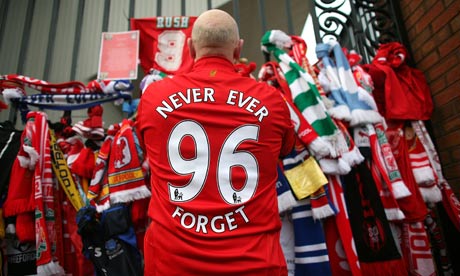Had responsibility for the football tragedy been accepted early on, there would be no need for a parliamentary debate

A Liverpool fan pays his respects at the Hillsborough memorial at Anfield. Photograph: Christopher Furlong/Getty Images
The families of the 96, mostly young, people who died on the terraces of Hillsborough have waited 22 years, not only for the authorities culpable to acknowledge their responsibility. It has also taken this long for the families' cause to be understood by the public, who were largely taken in by false stories of drunken and ticketless fans, on to whom the South Yorkshire police sought to deflect blame from their own negligence.
Steve Rotheram, Labour MP for Liverpool Walton, captured public empathy with the bereaved families by the simple act of reading the victims' names out in parliament: with 96 dead, it takes a heartbreakingly long time.
Even the Conservative prime minister recognises there will be a reckoning, expected in May or June when the panel reports, which will not reflect well on the South Yorkshire police of the time or, possibly, on Margaret Thatcher's government. The public has slowly sloughed off the false stories of supporter misbehaviour, spread by the police following the disaster and notoriously carried by the Sun under its infamous headline four days later, "The truth". The families are finally recognised not as ruffian scousers but exemplary mothers, fathers and relatives who have fought loyally for justice and the good names of their loved ones.
There are many thousands of official documents and many levels to the disaster, but key facts are known already. The FA Cup semi-final on 15 April 1989 between Nottingham Forest and Liverpool was held at the Hillsborough football ground, whose safety certificate was out of date – something the Football Association did not bother to check before hosting the match there. The 24,000 Liverpool fans had to be funnelled through just 23 turnstiles in the north and west sides of the ground, including the nasty Leppings Lane terrace.
The police did not manage to get supporters through before kick-off and a crush developed outside. Chief Superintendent David Duckenfield, commanding his first football match, ordered an exit gate to be opened, so that hundreds of fans could enter together. That would have been sensible, except the supporters were not directed away from the Leppings Lane central "pens", which were full by then while the sides still had room.
That was the "blunder" identified by Lord Justice Taylor, in his official report, as the "immediate cause of the disaster". Sheffield Wednesday had serious deficiencies in the safety of its ground, and Sheffield city council failed in its certifying responsibilities. Those three bodies paid damages to the families and victims who sued for negligence.
Had responsibility been accepted at the inquest that followed, there would be no campaign for justice, disclosure process and debates – like today's in parliament – 22 years later. However, lies were told from the beginning. Duckenfield told the FA's chief executive, Graham Kelly, on the scene, that fans had forced the exit gate, when in fact Duckenfield had ordered it to be opened.
Then the police relentlessly pushed the case, to the media, to Taylor and the inquest, that the fans had been drunk and so had caused the disaster – exactly how, they never quite specified. Taylor explicitly criticised that police case, saying it was "a matter of regret" that "such an unrealistic approach" had been taken – and he did not know what emerged later, that senior South Yorkshire police officers systematically had junior officers' statements changed, to present that case to Taylor.
The families have always felt the police were supported by Thatcher and her government after the briefings given the following day. That is why so much attention is focused on cabinet papers as the disclosure process continues.
When they are finally published in the panel's report, those papers may disappoint. But what's already certain is that a terrible 22 years on for the bereaved families, the injured and survivors, opinion about Hillsborough has finally turned – every day fewer believe the police lies. The real truth about what happened is coming to be accepted.
http://www.guardian.co.uk/commentisfree/2011/oct/17/hillsborough-disaster-legacy-lies?CMP=twt_gu
